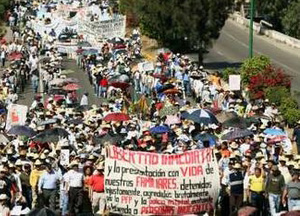 |
 |
 |
 Editorials | January 2007 Editorials | January 2007  
Civil Rights Abuse in Mexico of Concern to All
 Bob & Betty Press - Hattiesburg American Bob & Betty Press - Hattiesburg American


| | Thousands of supporters and members of the Popular Assembly of Oaxaca (APPO) take part in a march against the Governor of Oaxaca Ulises Ruiz and Federal police (PFP), in Oaxaca City December 10, 2006. (Reuters/Daniel Aguilar) |
A few months after Katrina, our hurricane-damaged roof was repaired by one of the numerous Mexican crews working the area. Undoubtedly some were here without documentation; but I was glad to get my roof repaired before the rains set in.

Now in the southern Mexican state of Oaxaca (pronounced Wa-hah-ka), usually a popular destination for tourists from the U.S., a struggle for human dignity and rights is under way. Brutal repression by police against protesters may send more Mexicans this way.

Whether out of concern about more illegal immigrants or concern about abuse of human rights, what is happening in southern Mexico should be of interest to both conservatives and liberals. Extremely low paid teachers, dirt-poor farmers and others have been staging public protests since last spring to win a greater share of the state budget - and respect for their traditions. They charge the state's governor with squandering public tax money on election campaigns and winning election himself fraudulently.

Federal and state police have struck back several times with massive force and vengeance. For example, hundreds were detained in late November without charges; many were beaten during arrest - and while in custody; others were tortured. Some 20 people were shot and killed by police, including American journalist Bradley Will, killed filming a street battle between police and demonstrators.

And the repression by the state continues.

While my wife, Betty, and I were there gathering facts in late December as part of a week-long, private U.S. and Canadian international human rights delegation, three leaders of the opposition movement were arrested. One had spoken to our group just the evening before. All three were severely beaten by state police then dumped at the edge of Oaxaca city, the state capitol.

Courageously, all three made it back to the city center and held an outdoor press conference to denounce the police. I could see bruises on the face of one of the men; another said he was beaten mostly in the stomach. As they spoke, several pick-up trucks with police in back wearing full riot gear drove slowly by in an unsuccessful attempt to intimidate those at the press conference.

One of a number of victims of police violence with whom we spoke is a professor. On Nov. 2, 2006, he was attending a peaceful planning meeting at the local university when some 20 federal police arrived. He took some photographs of the police and started to leave on his motorcycle. Police grabbed him and beat him so severely they cracked his motorcycle helmet, striking his ribs, back and kidney area with rifle butts.

He was thrown into a truck and taken to a helicopter along with some arrested teenagers and flown to a prison. In the air, police threatened to throw them out of the helicopter. In jail, he was denied medical treatment for three days and ordered to sign a confession of a crime he did not commit. He was finally given minimal treatment and released from custody after three weeks. Since then his office has been ransacked by police and he has been in hiding, emerging briefly to talk to us, at which time he also showed his wounds.

Mexico's presidential election last year brought a razor-thin victory to Felipe Calderon of the National Action Party (PAN); he needs the support of the Institutional Revolutionary Party (PRI) to govern. By sending federal troops to Oaxaca and not undermining the Oaxaca PRI governor, Ulises Ruiz, he helped assure PRI support for quick passage of his national budget, which includes a hike in social spending. But political winds are shifting: In Oaxaca, PRI lost all but a handful of recent elections to the federal Congress.

Many in the middle class in Oaxaca, especially those catering to tourists, oppose the protesters. And state authorities may have felt justified using force to end months of occupation of key public spaces in order to detain protesters, some of whom fought back with Molotov cocktails and stones. But most demonstrators, including those we saw on a blocks-long march, are peaceful, and many are mothers with children.

Mexico has always been proud of its image as a democratic state. But clearly Mexico has overstepped the bounds of legal responses to protests, abused human rights, and made a mockery of the rule of law with its abusive tactics.

It is time for U.S. citizens and U.S. officials to ask Mexico's new president to rein in the governor of Oaxaca, to investigate allegations of abuse on all sides, ending the impunity of state and federal police and bringing the guilty to trial. It is time to restart government negotiations with the indigenous people of Oaxaca and work toward a peaceful and fair future for all.

Bob Press is an assistant professor of political science, international development and international affairs at the University of Southern Mississippi. Betty Press teaches photography at USM. | 
 | |
 |



